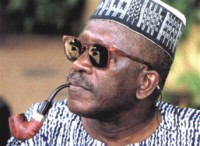Film
Ousman Sembene
Father of African Film
Sayeed Ahmad
 |
Ousman Sembene |
At the Taskent Film Festival in 1978 there were greats such as Raj Kapur, Shyam Benegal, Gulzar, Smita Patel and famous Russian Director Gerasimov and his wife Mrs. Makarova. Gerasimov was working on a film on the life of Leo Tolstoy in which he was playing the role of Tolstoy and his wife playing Mrs. Tolstoy.
Coming to know Ousman Sembene, the Senegalese film director at Taskent led to my first inroads into African films at such close range. He was known as the "Father of African Film". Ousman was born on 1st January, 1921 in Ziguinchor, a town in Casamance region. He went to Islamic school and later to a French school learning French and basic Arabic. His mother tongue was 'Wolof'. In 1936 he had to leave French school after an altercation with the principal. In 1944 he was drafted into the French army and fought for the French Forces. By now he had grown a leftist leaning joining railroad strikes, and became active in the French trade movement. He joined the Communist Party, helping a strike to hinder shipment of weapons for the French Colonial War in Vietnam.
His first novel was "The Black Docker", 1956. His second novel "Oh Country, my beautiful people", 1957 won international fame. This work was awarded by China, Cuba and Soviet Union and led to a course of study in Moscow at Gorki Studios in film making for a year. After 1960 Ousman returned to Senegal to take up serious film making so as to reach the widest possible public. His first feature "Le Noire de......" won the Jean Vigo Prize, bringing him world fame, followed by "Mandabi" in his native Wolof language, along with "Xala" 1975 and 'Ceddo' 1977.
I went to see his film screening at the Taskent Film Festival and met the leading lady of the film Ceddo. She was an African woman with a shinning personality. Her acting was excellent. Ousman made several other outstanding films in 'Swahili' language, "Guelwaar" in 1992. "Faat Kine" in 2000 and "Moolaade" in 2004. The latter won the Cannes Film Festival Award in 2004.
It was after seeing this film that Ousman explained to me his commitment towards African women. He felt deeply on the subject and the depressing state of women moved him to lay bare their ignominy and degradation. I informed him about the position of Bengali women and the dichotomy that exists in society where the mother image is upheld yet women are victims of terrible cruelty and discrimination. We talked long on this subject and could understand each others thoughts.
I was invited by UNESCO in 1982 to participate in the production of documentary films. The other four countries invited were India, Sri Lanka, Senegal and Nepal. At this time the renowned scholar was Matar M' Bow the Secretary General of UNESCO. He belonged to Senegal and was a man of great repute and erudition. He had been selected to the post because of his extraordinary intellect. He was supported by Mr Padgaonkar, Aide to the Secretary General. He had been Editor of Times of India a highly respected position, and was extremely supportive of the needs and concerns of developing countries. He belonged to Maharasthra.
The four of us met over stimulating discussions in between the festival activities. Bow raised the point of the lack of world media control and dissemination by Afro-Asian countries. He said Reuters, AP, AFP etc. dominate the Third World media. He visualised a time when the Arab and Afro-Asian nations would have their own press information network. It was not to be, as under American pressure he soon left the post. I was thrilled to revive my association with Ousman Sembene. I had already seen his films in Dhaka at the German Cultural Institute. He made films on the history of colonialism, the failings of religion, the new African bourgeoisie and the strength of African women. We were joined by the Indian woman director Sai Paranjape, the Sri Lankan director Guna Ratne and the Nepali director Prem who took part in the brain storming sessions. We were trying to find common ground for the theme of the documentary UNESCO wished to support. Director Ousman Sembene said he wanted to raise new issues and conflicts affecting our countries such as unemployment, political exploitation and women's sufferings.
On my return to Dhaka we got clearance to start the film entitled "A place in the Sun" with Abdullah-al-Mamun as Director and Anwar Hossain as cameraman on the subject of family planning, woman's changing status and its impact on national development.
Today as I recall this unique man of our times I am awestruck at his greatness. I was held spellbound when he would speak of Senegal's colonial past. There was no hatred or gall in his words. He looked upon life through a wide lens, encompassing the good, the bad and the ugly. Gradually his emphasis shifted from presenting the racial and economic oppression of the white masters, to the corrupt African elitist classes that followed.
The last time I met Ousman in Matar M 'Bow's office in Paris, he spoke eloquently with the Unesco Secretary General and as I watched them talk, these two great intellectuals, I felt gratified to be in their company. Africa, the cradle of humanity, was moving forward to find its place in the sun.
Copyright
(R) thedailystar.net 2009 |
